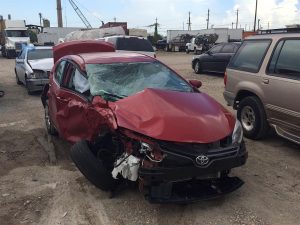The cost of truck insurance varies widely based on several factors, including the type of truck, the coverage options chosen, and the driver's experience. On average, owners can expect to pay between $100 and $400 per month for commercial truck insurance. This range can shift significantly depending on the specifics of the trucking business, such as the cargo being transported and the distance traveled.
Understanding these costs can help truck owners make informed decisions when selecting insurance policies. Many operators may find it beneficial to compare quotes from different insurers to secure the best rates.
Factors Influencing Truck Insurance Costs
Several key factors impact the monthly cost of truck insurance. Understanding these can help operators make informed decisions and potentially reduce their expenses.
Type of Truck
The specific type of truck plays a critical role in determining insurance rates. Different vehicles have varying levels of risk associated with them. For instance, a standard box truck generally carries lower premiums compared to a high-value specialty vehicle, such as a flatbed or refrigerated truck.
Insurers also consider the truck's size, weight, and overall safety features. Larger and heavier trucks may incur higher rates due to increased damage potential in the event of an accident. Additionally, trucks with advanced safety technologies may qualify for discounts, lowering overall insurance costs.
Trucking Operations
The nature of trucking operations significantly affects insurance costs. Companies involved in long-haul trucking may face higher premiums due to increased time spent on the road and greater exposure to risks. Conversely, local delivery operations typically present lower risks and thus may enjoy lower rates.
Type of cargo transported can also influence insurance costs. High-risk materials, such as hazardous substances, generally lead to higher insurance rates. Insurers assess the operational risks associated with the company's logistics, including delivery schedules and route safety, impacting the overall insurance premium.
Cargo Type
The cargo being transported is a vital consideration for insurers when determining rates. Certain types of cargo, like electronics or pharmaceuticals, may carry higher insurance costs due to their value and risk of theft or damage during transit. This necessitates specialized coverage plans to account for potential losses.
Conversely, transporting less valuable goods might incur lower premiums. Insurers also evaluate the probability of cargo claims based on industry standards and the specific risks associated with transporting particular goods. The more hazardous or valuable the cargo, the higher the potential insurance costs.
Driving History
A driver’s history is another significant factor that influences insurance premiums. Insurers typically review drivers' past incidents, including accidents, traffic violations, and claims made. A clean driving record usually results in lower insurance rates, while a history of accidents or suspensions can lead to higher costs.
The length of experience and specific qualifications of the drivers also matters. Drivers with more experience, particularly in long-haul trucking, are often viewed as lower-risk, leading to more favorable insurance terms. Insurers may offer discounts for advanced certifications or safety training.
Geographical Location
Geographical location heavily impacts truck insurance costs. Areas with higher accident rates or crime levels typically yield higher premiums. Urban environments, often associated with greater congestion and lower parking security, generally incur higher costs compared to rural locations.
In addition, different states have varying regulations and average claim costs that can influence rates. For instance, states with higher liability limits might reflect increased insurance costs. Operators need to consider their primary routes and parking locations while assessing potential insurance expenses.
Different Types of Truck Insurance Coverage
Truck insurance encompasses various coverage types essential for protecting both the vehicle and the driver. Each type plays a crucial role in managing risks associated with trucking operations, ensuring financial safety in case of accidents, damage, or liability.
Liability Insurance
Liability insurance is a fundamental requirement for truck operators. This coverage protects the insured against claims resulting from injuries or damages caused to other people or property.
If the driver is found at fault, liability insurance covers medical expenses, rehabilitation costs, and property damage if someone got injured in a truck crash . Coverage limits vary, but it's advisable to choose higher limits to ensure adequate protection. Commonly, policies reflect state minimum requirements, which might not suffice in severe accidents.
This type of insurance can also cover legal fees incurred while defending against claims. It is a critical element for any truck operator to consider for compliance and financial security.
Physical Damage Coverage
Physical damage coverage provides protection for the truck itself against risks such as theft, vandalism, or collision damage. This coverage is generally divided into two parts: collision coverage and comprehensive coverage.
Collision coverage pays for damages resulting from a collision, regardless of who is at fault. Conversely, comprehensive coverage covers non-collision incidents like natural disasters or fire.
Truck owners often consider their truck's value and the potential risks when selecting coverage types. Maintaining a proper balance between premiums and deductible amounts is essential to ensure both protection and affordability.
Cargo Insurance
Cargo insurance protects the goods transported by the truck. This coverage is essential for businesses that rely on transportation for their products. It safeguards against loss or damage to cargo during transit.
Factors influencing cargo insurance rates include the nature of the goods, transport routes, and the duration of shipping. Policies can cover various perils like theft, fire, or an accident causing damage.
Truck operators must adequately assess the value of their cargo when selecting coverage. Ensuring adequate protection not only secures assets but also enhances service reliability in the competitive logistics industry.
Bobtail Insurance
Bobtail insurance specifically covers trucks driving without a trailer, often called "bobtailing." Many truck operators encounter situations where they are not hauling cargo or a trailer, making this coverage particularly relevant.
This insurance offers liability protection for accidents occurring during these periods. For instance, if the truck is involved in a crash while returning from a delivery, bobtail insurance would cover liability costs.
It is important for truck operators to understand that standard liability policies may not extend to bobtailing scenarios. Therefore, obtaining this coverage is a crucial step in ensuring complete protection.
By understanding these various types of truck insurance coverage, truck owners can make informed decisions that protect their investments and ensure compliance with legal requirements.
Average Cost of Truck Insurance
The average cost of truck insurance varies based on several factors. Typically, owners can expect to pay between $750 and $1,200 per year for a standard policy.
Factors influencing these costs include:
- Type of truck: Different trucks, such as light-duty versus heavy-duty, affect premiums.
- Usage: Trucks used for commercial purposes may incur higher rates.
- Location: Regional risks can lead to varying insurance costs due to local regulations and traffic conditions.
Dedicated business owners can also explore specialized policies. These may come with additional protections relevant to specific industries.
To accurately gauge costs, truck owners should request quotes from multiple providers. Comparing different options will ensure that they attain the best coverage for their needs and budget.
How to Get the Best Truck Insurance Rates
To obtain optimal truck insurance rates, it's essential to implement specific strategies effectively. Key approaches include comparing quotes from different providers, maintaining an excellent driving record, adjusting deductibles, and reviewing coverage regularly.
Comparing Quotes
Comparing quotes is vital for finding the best insurance rates. Prospective policyholders should gather at least three to five quotes from multiple insurance companies to facilitate an accurate comparison.
When evaluating quotes, consider not only the premium costs but also the coverage limits, deductibles, and any discounts available. Utilizing online comparison tools can streamline this process. It's crucial to ensure that policies being compared offer equivalent coverage levels to avoid unexpected gaps.
Additionally, reviewing customer ratings and claims handling can provide insights into an insurer’s reliability. An informed choice based on thorough comparisons can lead to significant savings.
Maintaining a Good Driving Record
A clean driving record plays a crucial role in securing favorable truck insurance rates. Insurers often reward safe driving behaviors with lower premiums.
Keeping traffic violations, accidents, and claims to a minimum signals to insurers that the driver poses a lower risk.
To maintain a good record, drivers should practice safe driving habits, attend defensive driving courses, and avoid distractions. Some insurance companies may also provide a discount for completing such courses. Regularly checking one’s driving record for inaccuracies can prevent issues that may affect insurance rates.
Increasing Deductibles
Increasing the deductible on a truck insurance policy can lead to lower monthly premium costs. A deductible is the amount a policyholder must pay out-of-pocket before the insurance coverage kicks in.
When selecting a higher deductible, it’s important for drivers to assess their financial situation. They should determine if they can comfortably cover the higher deductible in the event of a claim.
For those who rarely file claims, opting for a higher deductible can yield substantial savings over time. This strategy should align with individual risk tolerance and financial capability.
Reviewing Coverage Annually
Annual reviews of truck insurance coverage are essential to ensure that policies stay relevant to changing needs and circumstances. Regularly assessing the coverage can help adjust for new vehicles, shifts in business operations, or changes in state laws.
Policyholders should examine their current coverage limits and deductibles. They can also identify potential discounts for which they may not have applied previously.
Engaging with an insurance agent for an annual check-up can provide valuable insights and recommendations tailored to current needs. This proactive approach can uncover opportunities to enhance coverage while decreasing costs.
Depending on the truck's value, these insurance costs can significantly impact the overall expense of truck insurance. A knowledgeable professional can evaluate coverage options to ensure adequate protection in case of an accident.
Legal Aspects of Truck Insurance
Truck insurance operates under various legal requirements that can differ by state and country. Companies must comply with regulations set forth by entities like the Federal Motor Carrier Safety Administration (FMCSA).
There are mandatory coverage types, including:
- Liability Insurance: Covers damages to other parties in the event of an accident.
- Cargo Insurance: Protects the goods being transported.
- Physical Damage Insurance: Covers repairs to the truck itself.
Failing to maintain these insurance types can lead to significant legal penalties. Trucking companies may face fines and liabilities if inadequately insured.
Additionally, legal representation may be necessary when dealing with disputes related to truck accidents. For example, a Phoenix truck accident lawyer can help navigate the complex legal landscape following an accident.
Legal firms like Wyatt Injury Law often specialize in personal injury and liability cases within the trucking industry. They provide essential services to help clients understand their rights and obligations under the law.
Awareness of local laws regarding trucking insurance is crucial. Every state may impose different minimums for coverage, which trucking companies must adhere to in order to operate legally.
Minimizing Risks to Reduce Insurance Costs
Implementing strategies to minimize risks can lead to lower truck insurance costs. Focused efforts on driver training, vehicle upkeep, and strict safety protocols are essential to achieving this goal.
Driver Training Programs
Investing in driver training programs is a practical strategy for reducing insurance costs. These programs enhance the skills of drivers, promoting safer driving habits and reducing the likelihood of accidents.
Some effective training components include:
- Defensive Driving Techniques: Teaching drivers to anticipate potential hazards.
- Regulatory Compliance: Ensuring awareness of local traffic laws and regulations.
- Regular Assessments: Conducting periodic evaluations to reinforce on-road skills.
Insurance companies often recognize these initiatives, leading to potential discounts on premiums.
Vehicle Maintenance
Regular vehicle maintenance is crucial in minimizing risks associated with breakdowns and accidents. Proper upkeep can prevent costly repairs and safety incidents.
Key maintenance practices include:
- Routine Inspections: Regular checks on brakes, tires, and lights.
- Timely Repairs: Addressing any mechanical issues promptly.
- Documentation: Keeping detailed records of maintenance schedules.
Insurance providers typically favor fleets that demonstrate a commitment to maintaining their vehicles, which can yield lower insurance premiums.
Safety Procedures and Compliance
Establishing and enforcing safety procedures is vital for reducing risk in trucking operations. Comprehensive safety measures contribute to a culture of safety among all employees.
Important safety protocols include:
- Accident Reporting Procedures: Clear steps for employees to follow in case of an incident.
- Safety Equipment: Ensuring that vehicles are equipped with necessary safety gear, such as fire extinguishers and first-aid kits.
- Regular Training: Continuous safety education for all personnel.
By prioritizing safety compliance, companies can significantly decrease the chances of accidents, which may lead to reduced insurance costs over time.
The Impact of Insurance Claims on Monthly Premiums
Insurance claims significantly influence monthly premiums for truck insurance. When a claim is filed, insurers assess the risk associated with the policyholder.
A history of claims can lead to higher premiums. Statistics show that individuals with multiple claims often face increased rates due to perceived risk. These adjustments can be substantial, affecting the budget for those relying on trucking for income.
Factors that influence premium changes include:
- Type of Claim: Liability claims tend to impact premiums more than physical damage claims.
- Frequency of Claims: Repeated claims can indicate a higher risk, leading to increased costs.
- Severity of Claims: High-cost claims can trigger higher rates due to financial liability for the insurer.
Even minor claims may affect premiums, though not as drastically. Truck owners should weigh the benefits of filing a claim against potential premium increases.
Consulting with legal experts, like those at Wyatt Injury Law, can provide insight into the implications of filing claims and how to navigate disputes with insurers. Maintaining a clean claims history is essential for keeping costs manageable.
State Regulations and Truck Insurance
State regulations play a vital role in determining truck insurance costs. Each state has different requirements for coverage, which can significantly affect monthly premiums.
Minimum Coverage Requirements
Typically, each state mandates a minimum level of liability coverage. This may include:
- Bodily Injury
- Property Damage
- Cargo Insurance (for certain types of hauls)
Variations by State
In addition to minimum coverage, states may have unique laws affecting insurance:
- Rate Regulation: Some states regulate the rates insurers can charge.
- No-Fault Laws: A few states require no-fault coverage, impacting insurance needs.
- Special Permits: States can issue special permits that mandate additional coverage for certain routes or types of cargo.
Impact on Premiums
Due to these variations, premiums can fluctuate widely. For example, states with higher accident rates may lead to increased costs for truck insurance.
It's essential for truck operators to familiarize themselves with local regulations and consult an insurance agent. This ensures compliance and helps in finding the best rates available.






















